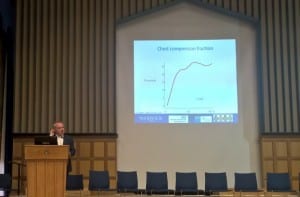 On Wednesday 27th April, Professor Siriwardena, Viet-Hai Phung and Fiona Togher attended the launch event of the National Institute for Health Research (NIHR) themed review of prehospital care. This was held at Firth Court, University of Sheffield. The session was action-packed and included four presentations from senior prehospital care researchers whose work had been included as part the review. Within these presentations Professor Siriwardena spoke about patient outcomes and experience in relation to the ambulance service and detailed some of the work that has been undertaken within CaHRU and collaboratively with EMAS and the University of Sheffield. This included the Prehospital Outcomes for Evidence Based Evaluation (PhOEBE) programme – focussing particularly on the qualitative work we did to explore what was of value to patients that needed to access emergency ambulance care. Professor Siriwardena’s presentation was informative, insightful and particularly well received by the patient and public involvement group members that were in the audience.
On Wednesday 27th April, Professor Siriwardena, Viet-Hai Phung and Fiona Togher attended the launch event of the National Institute for Health Research (NIHR) themed review of prehospital care. This was held at Firth Court, University of Sheffield. The session was action-packed and included four presentations from senior prehospital care researchers whose work had been included as part the review. Within these presentations Professor Siriwardena spoke about patient outcomes and experience in relation to the ambulance service and detailed some of the work that has been undertaken within CaHRU and collaboratively with EMAS and the University of Sheffield. This included the Prehospital Outcomes for Evidence Based Evaluation (PhOEBE) programme – focussing particularly on the qualitative work we did to explore what was of value to patients that needed to access emergency ambulance care. Professor Siriwardena’s presentation was informative, insightful and particularly well received by the patient and public involvement group members that were in the audience.
 Professor Tom Quinn also gave a fascinating presentation about the work undertaken by Kingston University and the University of London around the effectiveness of introducing a mechanical chest compression device into front-line emergency response vehicles. They hypothesis was that the use of mechanical devices (rather than administering manual resuscitation) should improve survival from out of hospital cardiac arrests. Interestingly though, the research team concluded from the evidence that adopting these devices routinely would not improve patient outcomes.
Professor Tom Quinn also gave a fascinating presentation about the work undertaken by Kingston University and the University of London around the effectiveness of introducing a mechanical chest compression device into front-line emergency response vehicles. They hypothesis was that the use of mechanical devices (rather than administering manual resuscitation) should improve survival from out of hospital cardiac arrests. Interestingly though, the research team concluded from the evidence that adopting these devices routinely would not improve patient outcomes.
 Following the research presentations the session continued with Daniel Mason, a member of the National Ambulance Commissioners Network sharing some of his thoughts on the research presented in the review in relation to the provider-commissioner relationship. One of the key points he highlighted was a need to include commissioners in the dissemination of key research findings that could have an impact on policy and practice. Finally, Derek Prentice, the chair of the lay group of the Royal College of Emergency Medicine reminded the delegates that ultimately the purpose of undertaking any healthcare research, not just prehospital research, is to improve the quality of care and the quality of experience provided to patients. It is patients that must remain at the centre of everything that we as researchers do.
Following the research presentations the session continued with Daniel Mason, a member of the National Ambulance Commissioners Network sharing some of his thoughts on the research presented in the review in relation to the provider-commissioner relationship. One of the key points he highlighted was a need to include commissioners in the dissemination of key research findings that could have an impact on policy and practice. Finally, Derek Prentice, the chair of the lay group of the Royal College of Emergency Medicine reminded the delegates that ultimately the purpose of undertaking any healthcare research, not just prehospital research, is to improve the quality of care and the quality of experience provided to patients. It is patients that must remain at the centre of everything that we as researchers do.
Overall the event was a wonderful opportunity to hear about some of the major prehospital care research projects that have been undertaken with the support of NIHR funding during the last ten years. As the official event due to a close the delegates gathered over lunch and networking with colleagues with similar interests resumed. Upon reflection it was exciting to get a glimpse of the progress that has been made in the field of prehospital care research and to look forward to the contribution that CaHRU will continue to make in this area of healthcare research.
By Fiona Togher

